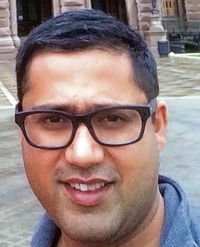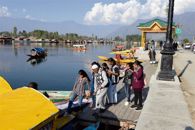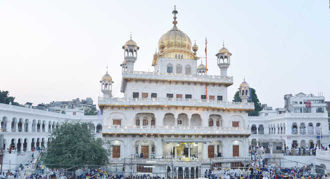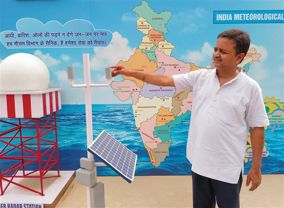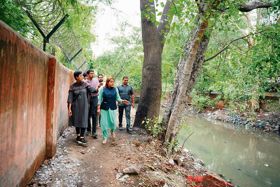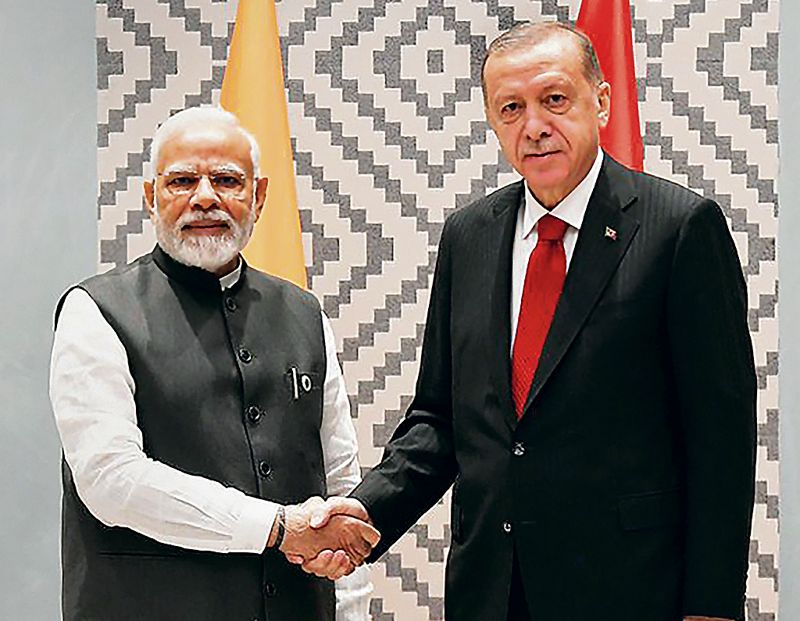
Security cooperation: Inclusion of India and Turkey allows the SCO to lessen the overbearing influence of China and Russia. PTI
Luv Puri
Journalist And Author
The participation of Presidents of Russia, China, Iran and Turkey — Vladimir Putin, Xi Jinping, Ebrahim Raisi and Recep Tayyip Erdogan, respectively — and Prime Minister Narendra Modi in the 22nd meeting of the Council of Heads of State of the Shanghai Cooperation Organisation (SCO) in Samarkand, Uzbekistan, has turned the spotlight on the regional grouping, which is historically anchored in security issues.
Besides discussions on extremism, terrorism and the situation in Afghanistan, the SCO agenda seems to be in continual expansion mode as climate change, technology issues, security of supply chains, energy and food and connectivity were some of the other agenda items that were discussed. The SCO has gained enhanced attention in the context of the West and some of its allies being uneasy with China and Russia, particularly with regard to the Russian invasion of Ukraine and China’s bellicosity vis-à-vis Taiwan.
On paper, the SCO is described as “one of the largest plurilateral, covering around 40 per cent of the global population and 30 per cent of the global GDP.” The group’s present and future salience needs to be understood from an analysis of its composition and its foundational moorings. At the practical level, the salience of such a grouping is on account of financial or military muscle of the members. In the not-too-distant past, the SCO was seen as a forum of China and Russia for security cooperation in relation to Central Asia.
China, Russia and four Central Asian states — Kazakhstan, Kyrgyzstan, Uzbekistan and Tajikistan — are the founding members of the SCO. With the admission of Uzbekistan, the Declaration of Shanghai Cooperation Organisation was signed on June 15, 2001.
Only in 2017, India and Pakistan were granted the SCO membership and Iran became a member this year. The SCO now has several observers, guest members and dialogue partners. The dialogue partners include Turkey, Armenia, Azerbaijan, Cambodia, Nepal and Sri Lanka. The observers are Belarus, Afghanistan and Mongolia. There are other Middle East countries like Saudi Arabia, Qatar and Egypt, who are the additional dialogue partners.
The summit reportedly had two sessions — a restricted session only for the SCO member states and an extended session included participation by observers and special invitees. Besides expected discussions on extremism, terrorism and the situation in Afghanistan, the SCO agenda seems to be in a continual expansion mode as climate change, technology issues, security of supply chains, energy and food, transit rights and connectivity were some of the other agenda items that were discussed.
The SCO has gained enhanced attention in the context of the West and some of its allies being uneasy with China and Russia, particularly with regard to the Russian invasion of Ukraine and China’s bellicosity vis-à-vis Taiwan. Till 2015, the year when the proposal of admitting India and Pakistan was mooted, the SCO was deeply invested in the Central Asia security cooperation in multiple arenas as this author learnt while managing a European Union-sponsored multilateral project in the region.
With a connection to the erstwhile Soviet Union, Russia remained an important player in the Central Asian countries. Russian is the language that threads the region. In the past two decades, China’s economic rise enabled it to spread its tentacles in the region and apart from being heavily involved in infrastructural projects, some of the vital energy resources find their market in China.
The political elites in Central Asia are perpetually wary of the spread of radicalisation in their own boundaries. The Islamic Movement of Uzbekistan (IMU) is one organisation that has remained on its radar as it is closely allied with the Taliban. After 9/11, Central Asian countries, particularly Uzbekistan and Tajikistan, readily provided their bases to US troops for their operations in nearby Afghanistan. In 2002, the SCO members had agreed to create a Regional Anti-Terrorist Structure (RATS) of the SCO in Tashkent, which is supposed to be a “coordinating centre for combating terrorism, separatism and extremism at the regional and global levels.” The dangers didn’t recede. In 2014-15, the highest number of foreign fighters that joined the Islamic State in the Syria-Iraq war theatre was from Central Asia, a number reportedly the same as from Western Europe. A number of extremists from Central Asia are already present in the Taliban-ruled Afghanistan. In addition, Qari Fasihuddin, a Tajik from Afghanistan, is the acting army chief of Taliban. Fasihuddin belongs to the Badakhshan province, an area that borders Tajikistan, China and Pakistan-controlled Gilgit-Baltistan.
In the present context, the inclusion of India and Turkey allows the SCO to lessen overbearing influence of China and Russia. Turkey, a NATO member which at present is only a dialogue partner, has economic and political interests in Central Asia.
Turkey has sought to create its own sphere of Turkic-speaking countries by forming the Cooperation Council of Turkic-Speaking States or the Turkic Council established in 2009. In Central Asia, the three countries — Uzbekistan, Kazakhstan and Kyrgyzstan — are part of the council as the native languages in these countries are of the Turkic origin. As pointed earlier, Russian is also spoken in Central Asia because of its association with the former Soviet Union. The two non-members of the council in the region are Tajikistan, which is Persian-speaking and shares ethnicity with northern Afghanistan, and Turkmenistan, where the native language is of the Turkic origin, but the political leadership invokes the neutrality principle in order to avoid hurting its equities with Russia.
India’s membership of the SCO and consistent recent high-level representation in annual summits come at a time when it continues to enhance military and economic ties with some of the key players in the western orbit such as the US, EU countries, Israel, Japan and Australia. Writing in the Tel Aviv-based Jerusalem Post, Seth J Frantzman said, “With the exception of India, the countries that attend the SCO are generally authoritarian regimes.” While maintaining its old historic relations with Russia and the Central Asian countries, India’s concerns about China and Pakistan on territorial expansionism and cross-border terrorism, respectively, are an open secret. Next year, India is going to host the annual SCO summit; India is the current chair of the executive council of the SCO RATS and will be hosting the SCO RATS council meeting this October. There are similar challenges. For instance, SCO members Kyrgyzstan and Tajikistan are actively involved in fighting over territorial disputes. The same is the case with SCO dialogue partners, namely Armenia and Azerbaijan.
Notwithstanding the inherent differences in political systems and values, the practical execution of the ambitious agenda of the SCO will predicate on many factors, including the shadow of bilateral contestations and comfort level of others with respect to China and Russia. At the same time, the participation of many executive heads of various countries, apart from China and Russia, in the SCO seemingly indicates that the members are keen to take the leap of faith and explore the future salience of the grouping in their own interests.
Join Whatsapp Channel of The Tribune for latest updates.






